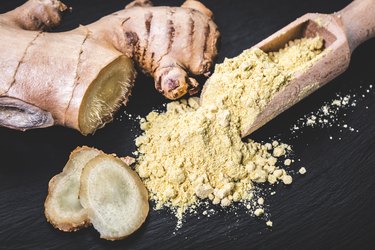
Drinking ginger beer may offer you some helpful health benefits, primarily as a result of its titular ingredient. People have used ginger root for centuries, to help with nausea and other stomach ailments. Ginger beer may help you get some of the same benefits.
What is Ginger Beer?
Video of the Day
Ginger beer is made from fresh or dried ginger, sugar and lemon juice. Traditionally, people fermented the ingredients with sugar and then added yeast to create an alcoholic ginger beer. In recent years, ginger beer has become more commonly available as a non-alcoholic beverage that relies on carbonation, not fermentation, for its bubbles.
Video of the Day
Ginger beer is often described as having a stronger, spicier flavor than ginger ale. It is often used as a mixer in drinks, especially to make cocktails such as the Moscow Mule. However, you can also drink ginger beer on its own.
If you are interested in a drink that has some of the same potential ginger beer benefits, you may want to check out ginger water. Ginger water shares many potential benefits with ginger beer.
Potential Ginger Beer Benefits
Fresh and dried ginger both contain a variety of natural oils, but the two associated with ginger's health benefits are gingerol and shogaol. There are several studies that have looked at the positive effects of ginger and its extracts. However, there are no studies that have looked directly at ginger beer.
You should also keep in mind that research studies use various forms of ginger, in differing amounts. Though many studies show some promising benefits of consuming ginger, it is not likely that your ginger beer benefits will be the same as the studies, due to varying concentrations of ginger. As a result, you may not experience the many health benefits the researchers found in their studies from drinking ginger beer alone.
The Memorial Sloan Kettering Cancer Center notes that one of the benefits of ginger is aiding in digestion through the production of more saliva and stomach juices. The increased liquid can help relax the stomach and intestines, which can reduce nausea. They also indicated that some studies have shown that ginger may help patients following chemotherapy, but more research is needed.
According to a review in the Nutrition Journal in March 2014, when one is pregnant or has morning sickness, nonalcoholic ginger beer may provide some relief from nausea. The review also reported that ginger is safe, and doesn't cause harmful effects for pregnant people or their babies.
There have been several studies that have looked at the anti-cancer effects of gingerol. For example, a review published in Mini-Reviews in Medicinal Chemistry in April 2014 found that gingerol has anticancer effects.
In a pilot study published in Cancer Prevention Research, in April, 2013, researchers divided people at risk for colorectal cancer into two groups. One group took ginger every day for 28 days, while the other group took a placebo. In the ginger group, biological markers for cancer risk decreased.
People have long used ginger as an herbal medicine. In a study, published in August 2012 in the Asian Pacific Journal of Tropical Biomedicine, researchers found that ginger can help inhibit the growth of bacteria.
Another study published in the_ Journal of Ethnopharmacology_ in January 2013 found that ginger may be effective against viral infections as well. That study found that ginger helped to fight against RSV virus, which is a common cause of upper-respiratory infections.
Read more: Ginger And Ulcers
Ginger Beer Side Effects
Though a lot of research suggests that ginger is potentially good for you, it is possible that some of its side effects can be harmful to your health. For example, though ginger, like other foods, can benefit your heart, it can also cause side effects, by interacting with medications, and preventing your blood from clotting in the usual manner.
A review of studies, published in August 2014 in Natural Product Communication indicated that ginger can prevent your blood from clotting. The researchers believe that a small dose of ginger should not interact with blood-thinners, but they encourage people who use blood-thinner medications to avoid the long-term use of ginger. However, it is not clear if drinking ginger could have a similar effect on this class of drug's efficacy.
- Memorial Sloan Kettering Cancer Center: "Ginger"
- Nutrition Journal: "A Systematic Review and Meta-Analysis of the Effect and Safety of Ginger in the Treatment of Pregnancy-Associated Nausea and Vomiting"
- Cancer Prevention Research: "Effects of Ginger Supplementation on Cell-Cycle Biomarkers in the Normal-Appearing Colonic Mucosa of Patients at Increased Risk for Colorectal Cancer: Results From a Pilot, Randomized, and Controlled Trial"
- Mini-Reviews in Medicinal Chemistry: "[6]-Gingerol as a Cancer Chemopreventive Agent: A Review of its Activity on Different Steps of the Metastatic Process"
- Journal of Ethnopharmacology:"Fresh Ginger (Zingiber Officinale) Has Anti-Viral Activity Against Human Respiratory Syncytial Virus in Human Respiratory Tract Cell Lines"
- Asian Pacific Journal of Tropical Biomedicine: "Antibacterial Effect of Allium Sativum Cloves and Zingiber Officinale Rhizomes Against Multiple-Drug Resistant Clinical Pathogens"
- Natural Product Communication: "Warfarin Interactions With Medicinal Herbs"
Was this article helpful?
150 Characters Max
0/150
Thank you for sharing!
Thank you for your feedback!